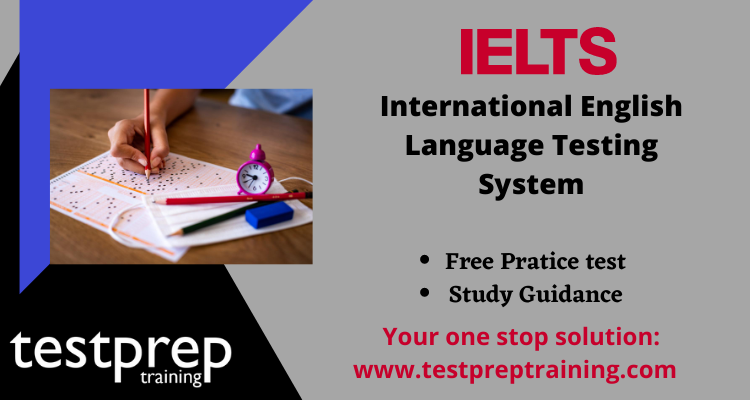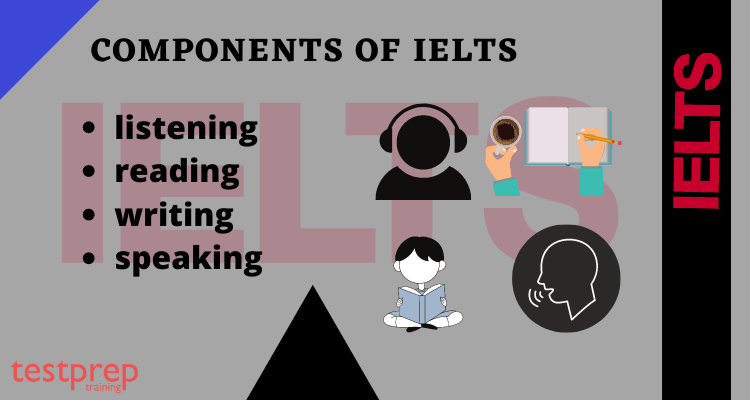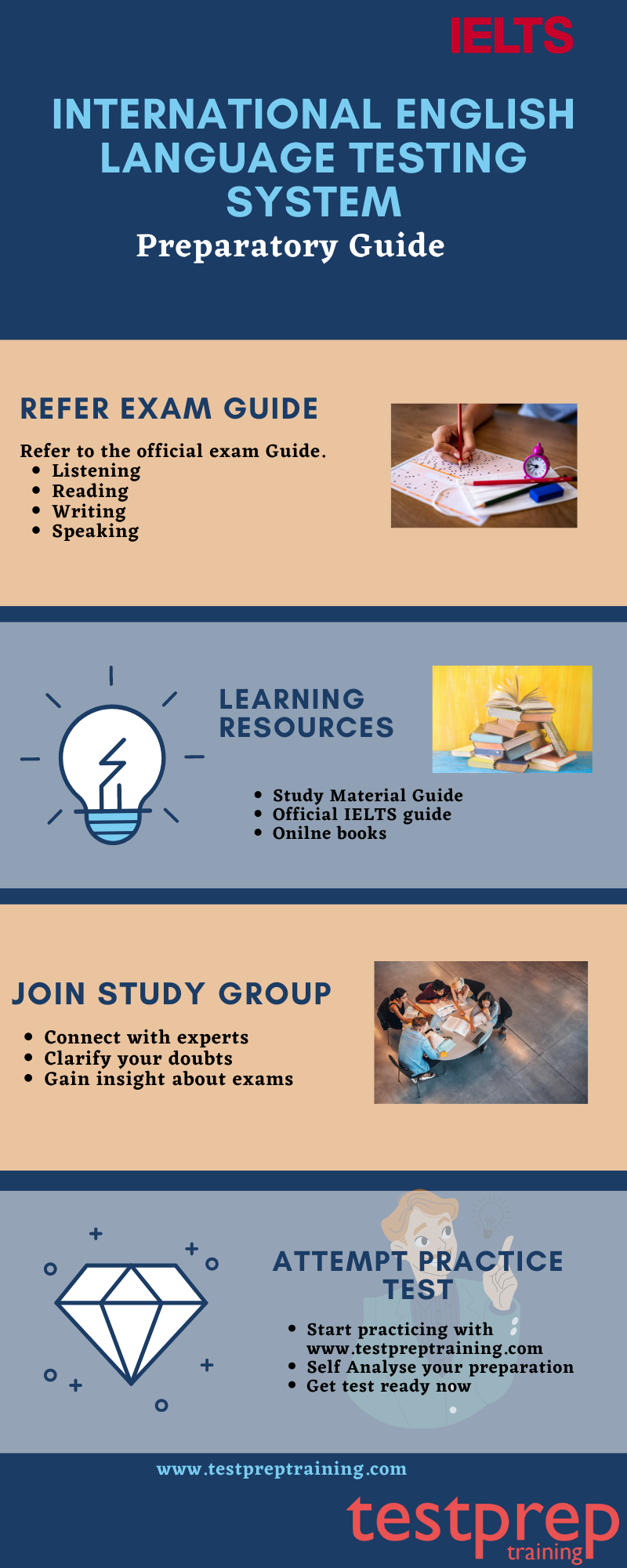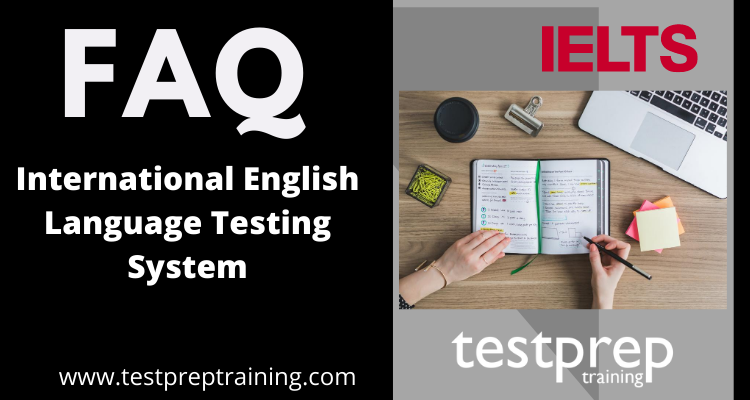IELTS Exam

The International English Language Testing System (IELTS) examination is the world’s most accepted and demanding English Language proficiency test. The examination test’s a candidate’s ability to read, write, listen, and speak clearly in Eglish language. The IELTS examination is widely accepted for Higher Education and Global Migration. IELTS is jointly owned by British Council, IDP: IELTS Australia and Cambridge Assessment English. Governments of various countries such as Australia, Canada, New Zealand, and the United Kingdom use IELTS to process immigration applications.
Target Audience
The International English Language Testing System is especially to check and assess the English language proficiency of the candidates who wish to study abroad or are willing to work outside their country. This exam can also be taken by those candidates who wish to settle with their spouse or children who are living abroad in an English speaking country.
Types of IELTS
Regular IELTS
The regular IELTS is categorized as:
Academic IELTS
It is suitable for those candidates who wants to pursue education in abroad. It test a candidates ability to speak,listen, write and read in English language.
General Training IELTS
It is suitable for those candidates who wants to work in abroad. The tasks and tests reflect both workplace and social situations.
UKVI IELTS
UKVI IELTS is especially for those candidates who are willing to take admission to an undergraduate or postgraduate course in the UK. also, this is suitable for those candidates who are willing to work in the UK. The IELTS UKVI Academic and General Training tests are suitable for you if you’re applying for Tier 1 and Tier 2 visas to the United Kingdom. The UKVI examination is further classified as:
IELTS for UKVI Academic
The IELTS for UKVI Academic examination is for those candidates who wish to take admission to UK university at an undergraduate or postgraduate level and for those seeking professional registration in the UK.
IELTS for General Training
The IELTS for UKVI General Training examinations is for those candidates who are wishing to migrate to the UK and for those wishing to train or study below degree level.
IELTS Life Skills Examination
IELTS Life Skills is a UK government-approved Secure English Language Test (SELT), this exam to check your listening and speaking ability at Level A1, A2 or B1 of the Common European Framework of Reference for Languages. This examination can be taken by the following candidates who are willing to apply for the following:
- family visa extension to family, spouse, or partner visa
- indefinite leave to remain or citizenship.
There are three levels in the IELTS Life Skills examination, A1, A2(offered only in the UK), and B1. Each level tests the candidate’s ability to listen and speak clearly in the English language. The candidate can check with the receiving authority to check for the level they want.
The candidate should consult the receiving organization before choosing the type of examination.
Components of IELTS

The IELTS examination consists of four modules. However, it is important for the test taker to appear in all the four modules, or else the final band won’t be given and the result will become invalid. Below is a brief description of all the four modules:
Listening
The listening examination is of 30 minutes. It consists of four sections. The audio dialogue or monologue is played on cassette tape and you will be given headphones for the exam. However, the test is played only once and students should answer each question while listening to the audio itself. But an ample amount of time is given to the candidate for reviewing their answers.
Reading
The test taker is given 60 minutes to complete the examination. Students are given an Academic Reading test or a General Training Reading test. Both tests consist of three sections, and in both tests, the sections are in order of increasing difficulty.
Writing
The writing section is of 60 minutes. Moreover, depending upon the module chosen by the student which can be either academic or general training, students must perform two writing tasks, which require different styles of writing. Also, there is no choice of question topics
Speaking
The speaking section is a one-to-one interview with an invigilator, the interview is recorded and has three separate parts:
An introduction and interview, an individual long turn where the candidate speaks for one or two minutes on a particular topic, and also a two-way discussion thematically linked to the individual long turn. This interview will last for approximately 11-14 minutes.
Exam Registration
For registering the candidate can follow these steps:
Step 1: You need to find the nearest test center. There are more than 1,600 IELTS test locations in over 140 countries.
Step 2: You need to register and pay online for the examination. You can also download the application form, which you can print fill and submit to your local test center. Also, you need to submit a copy of your passport and you will also need to present the same identity document on the day of the test.
Step 3: After your application is processed, the center will send you a written confirmation of the date and time of your test. Speaking and Writing tests typically take place on the same day. However, if this is not possible, the tests will take place within seven days of each other.
You can also register for the examination with the official partners, British Council and IDP.

IELTS Score
The IELTS examination score is given on bands score on a scale from 1 (the lowest) to 9 (the highest). Below is the detailed information about the scoring of IELTS examination.
| Band score | Skill level | Description |
|---|---|---|
| Band 9 TO 7 | ||
| 9 | Expert user | The test taker has fully operational command of the language. Their use of English is appropriate, accurate and fluent, and shows complete understanding. |
| 8 | Very good user | The test taker has fully operational command of the language with only occasional unsystematic inaccuracies and inappropriate usage. They may misunderstand some things in unfamiliar situations. They handle complex and detailed argumentation well. |
| 7 | Good user | The test taker has operational command of the language, though with occasional inaccuracies, inappropriate usage and misunderstandings in some situations. They generally handle complex language well and understand detailed reasoning. |
| Band 6 TO 1 | ||
| 6 | Competent user | The test taker has an effective command of the language despite some inaccuracies, inappropriate usage and misunderstandings. They can use and understand fairly complex language, particularly in familiar situations. |
| 5 | Modest user | The test taker has a partial command of the language and copes with overall meaning in most situations, although they are likely to make many mistakes. They should be able to handle basic communication in their own field. |
| 4 | Limited user | The test taker’s basic competence is limited to familiar situations. They frequently show problems in understanding and expression. They are not able to use complex language. |
| 3 | Extremely limited user | The test taker conveys and understands only general meaning in very familiar situations. There are frequent breakdowns in communication. |
| 2 | Intermittent user | The test taker has great difficulty understanding spoken and written English. |
| 1 | Non-user | The test taker has no ability to use the language except a few isolated words. |
| 0 | Did not attempt the test | The test taker did not answer the questions. |
IELTS FAQ
For more information regarding the IELTS examination, visit IELTS FAQ.
Preparatory Guide
Preparing with the right resources is the key to clear any exam. Moreover, you need consistency and determination throughout your journey towards the exam. Further, you must follow a study pattern while learning from authentic and genuine resources. This Preparatory Guide will act as a bridge for your career advancements. Success can be achieved only with the right methodology and determination. Let’s discuss step by step-

Refer the Exam Guide
For examination, it is important to familiarise yourself with the format of the test by reviewing the content of the test, as well as the question and task types for each section. However, it is mandatory that the candidate should read through the IELTS rules and regulations. You need to go through the exam format for better clarification.
Learning Resources
The second step to success is to practice. The IELTS examination having 4 modules require practice at a different level. You can practice from official guides. Also,many books and online resources available for the same. IELTS has developed two sets of official practice materials, designed to help you understand the test format and the types of test questions.
Join Study groups
Joining study groups is a good way to get yourself fully involved with the certification exam you applied for. These groups will help you get up to date with the latest changes or any update happening exam. Also, these groups contain both beginners as well as professionals. Moreover, you can ask any query related to the exam or you can talk about the exam without any hesitation.
Practice Tests
Practice tests are important during the preparation time. As when the candidate completes one topic or section then the best way to assess yourself is by solving practice tests. This will not only help them remember things but also spot the weakest areas.


